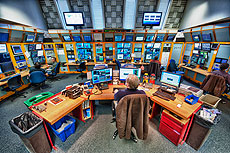Fermilab's Main Control Room
 |
|
Fermilab's Main Control Room remains as busy as ever. Photo: Reidar Hahn
|
What do you do now that the Tevatron is shut down? This question, spurred by lay curiosity or by ignorance, plagues Fermilab employees and users. But Cindy Joe, an operator in the Main Control Room, has an answer.
"The Tevatron was just one of the many machines we run here," Joe said. "There are a lot of other experiments and a lot of science to be done."
The MCR is responsible for the transmission of the beam to about a half-dozen experiments scattered around the site. New experiments are coming online. Two weeks ago, operators sent beam to the SeaQuest experiment for the first time.
On a map of Fermilab, Dan Johnson, head of Accelerator Operations, traced the old and current paths of the various particle beams on the Fermilab site.
"When the Tevatron was running, we'd use it for experiments that required an accelerated proton beam colliding with an antiproton beam. Now that it's shut down, we still accelerate the beam in the Booster and Main Injector, but we send it directly to the experiments that need it," Johnson said.
The walls of the MCR are plastered with computer monitors. Joe gestured to the eight computer monitors above her desk that vertically ascend two by two until they reach the ceiling. These eight screens act like EKG machines, monitoring the proton beam as it passes to the various different experiments.
Since the Tevatron shut down, the scientists and engineers responsible for its upkeep have focused on the other experiments that hunger for more beam. The need for beam continues to increase as Fermilab pushes further into the Intensity Frontier.
As for MCR, it's business as usual. Fermilab still beats to the rhythm of the bloops and beeps that tell the MCR operators "all clear" or "something's wrong." If something isn't working properly, the MCR is the first place to know. It is manned 24 hours a day, 365 days a year and will continue to be as Fermilab transitions to the next frontier.
"We are the first line of defense if anything goes wrong," Joe said. "If there is a problem, we know about it, and we find a way to fix it."
—Sarah Charley
|